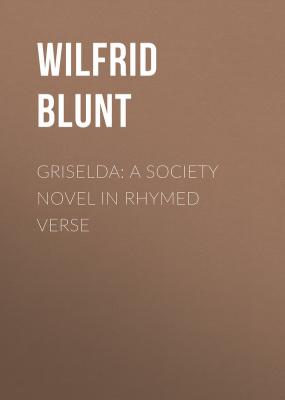Griselda: a society novel in rhymed verse. Blunt Wilfrid Scawen
Читать онлайн.| Название | Griselda: a society novel in rhymed verse |
|---|---|
| Автор произведения | Blunt Wilfrid Scawen |
| Жанр | Зарубежные стихи |
| Серия | |
| Издательство | Зарубежные стихи |
| Год выпуска | 0 |
| isbn |
Before him. She was standing by his bed
Holding a candle. It was cold, she said,
And shivered. And he saw her wrap her shawl
About her shoulders closely like a pall.
Why was she there? Why weeping? Why this light,
Burning so brightly in the dead of night?
These riddles poor Lord L.'s half-wakened brain
Tried dimly to resolve, but tried in vain.
"I cannot sleep to-night," went on the voice,
"The streets disturb me strangely with their noise,
The cabs, the striking clocks." Lord L.'s distress
Struggled with sleep. He thought he answered "Yes."
"What can I do to make me sleep? I am ill,
Unnerv'd to-night. This house is like a well.
Do I disturb you here, and shall I go?"
Lord L. was moved. He thought he answered "No."
"If you would speak, perhaps my tears would stop.
Speak! only speak!"
Lord L. here felt a drop
Upon his hand. She had put down the light,
And sat upon his bed forlornly white
And pale and trembling. Her dark hair unbound
Lay on her knees. Her lips moved, but their sound
Came strangely to his ears and half-unheard.
He only could remember the last word:
"I am unhappy – listen L.! – alone."
She touched his shoulder and he gave a groan.
"This is too much. You do not hear me. See,
I cannot stop these tears. Too much!"
And he
Now well awake, looked round him. He could catch
A gleam of light just vanished, and the latch
Seemed hardly silent. This was all he knew.
He sat some moments doubting what to do,
Rose, went out, shivered, hearing nothing, crept
Back to his pillow, where the vision wept
Or seemed to weep awhile ago, and then
With some disquiet went to sleep again.
Next morning, thinking of his dream, Lord L.
Went down to breakfast in intent to tell
The story of his vision. But he met
With little sympathy. His wife was late,
And in a hurry for her school of art.
His lordship needed time to make a start
On any topic, and no time she gave.
Griselda had appointments she must save,
And could not stop to hear of rhyme or reason —
The dream must wait a more convenient season.
And so it was not told.
Alas, alas!
Who shall foretell what wars shall come to pass,
What woes be wrought, what fates accomplishèd,
What new dreams dreamt, what new tears vainly shed,
What doubts, what anguish, what remorse, what fears
Begotten in the womb of what new years! —
And all because of this, that poor Lord L.
Was slow of speech, or that he slept too well!
CHAPTER II
Thus then it was. Griselda's childhood ends
With this untoward night; and what portends
May only now be guessed by those who read
Signs on the earth and wonders overhead.
I dare not prophesy.
What next appears
In the vain record of Griselda's years
Is hardly yet a token, for her life
Showed little outward sign of change or strife,
Though she was changed and though perhaps at war.
Her face still shone untroubled as a star
In the world's firmament, and still she moved,
A creature to be wondered at and loved.
Her zeal, her wit, her talents, her good sense
Were all unchanged, though each seemed more intense
And lit up with new passion and inspired
To active purpose, valiant and untired.
She faced the world, talked much and well, made friends,
Promoted divers schemes for divers ends,
Artistic, social, philanthropical:
She had a store of zeal for each and all.
She pensioned poets, nobly took in hand
An emigration plan to Newfoundland,
Which ended in disaster and a ball.
She visited St. George's hospital,
The Home for Fallen Women, founded schools
Of music taught on transcendental rules.
L. House was dull though splendid. She had schemes
Of a vast London palace on the Thames,
Which should combine all orders new and old
Of architectural taste a house could hold,
And educate the masses. Then one day,
She fairly wearied and her soul gave way.
Again she sought Lord L., but not to ask
This time his counsel in the thankless task
She could no more make good, the task of living.
He was too mere a stranger to her grieving,
Her needs, her weakness. All her woman's heart
Was in rebellion at the idle part
He played in her sad life, and needed not
Mere pity for a pain to madness wrought.
She did not ask his sympathy. She said
Only that she was weary as the dead,
And needed change of air, and life, and scene:
She wished to go where all the world had been —
To Paris, Florence, Rome. She could not die
And not have seen the Alps and Italy.
Lord L. had tried all Europe, and knew best
Where she could flee her troubles and find rest.
Such was her will. Lord L., without more goad,
Prepared for travel – and they went abroad.
I will not follow here from day to day
Griselda's steps. Suffice it if I say
She found her wished-for Paris wearisome,
Another London and without her home,
And so went on, as still the fashion was,
Some years ago, e'er Pulman cars with gas
And quick night flittings had submerged mankind
In one mad dream of
